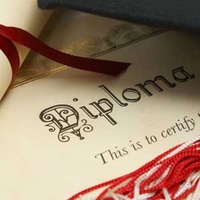Not everyone is cut out for school, college or university. It may be the alienating way we are assessed (does writing three essays in two hours really demonstrate your analytical abilities?) or a bad fit with educational institutions. I was disappointed, however, to learn that the next course of action for some people is to buy an accreditation.

diploma fraud
For the low price of US$159, you can get a diploma and transcript package and, bafflingly, ‘choose your degree style and wording’. The faker who presents a misspelt certificate in Comic Sans will certainly give the game away.
But what the hell do you gain from a fake diploma? If you’re lucky, a call for an interview—but that’s pretty much where it ends. Any savvy employer is going to sniff you out pretty quickly if you can’t answer questions in your area of expertise, ones that would be easy to respond to if you’d actually earned your qualification/s. If you manage to fool them, you step into a role for which you are not qualified, out of your depth and desperate to reach the end of the probationary period without anyone twigging. And when you’re unemployed again after a week, what has that fake accreditation achieved for you? A tarnished reputation, a waste of time and no closer to a real career, that’s what.
The problem with fake diplomas is the underlying concept that education ends in a piece of paper. It doesn’t. Good education, the kind that is regulated in Australia using the Australian Qualifications Framework (AQF) and provided by registered training organisations (RTOs) will deliver measurable outcomes to a standard that employers expect graduates to be able to demonstrate. And it doesn’t stop there; education is a lifelong process that may well start with an accreditation but then progresses using the critical thinking and other tools and skills you acquire during the learning experience.
So don’t devalue education through a fake diploma, lest karma find a way to show you why we have educational standards in the first place. Have you ever been treated by a fake dentist?
Things to do instead of buying a fake diploma:
- Study for a real one.
- If you’re not cut out for traditional tertiary study, consider alternatives such as apprenticeships, traineeships, or cadetships.
- Work your way up, as far as you can. Experience counts for something and in some industries you could make it to mid-career before you need a formal qualification.
Employers, if you suspect a job candidate has a fake accreditation, use this checklist:
- Look for spelling, punctuation and grammar mistakes on the certificate and/or transcript.
- Research the issuing institution: does it exist? Is it registered? If so, call up: does it have a record of the student enrolling and achieving an accreditation?
- Ask the candidate specific questions about the qualification, what s/he learnt, how s/he would apply it to the role you’re offering.
- Ask for a referee, the name of a tutor or lecturer who can vouch for the candidate. Don’t accept the contact number the candidate offers; if the referee is legitimate, the college or university will list his or her details.
This article originally appeared on coursesnow






